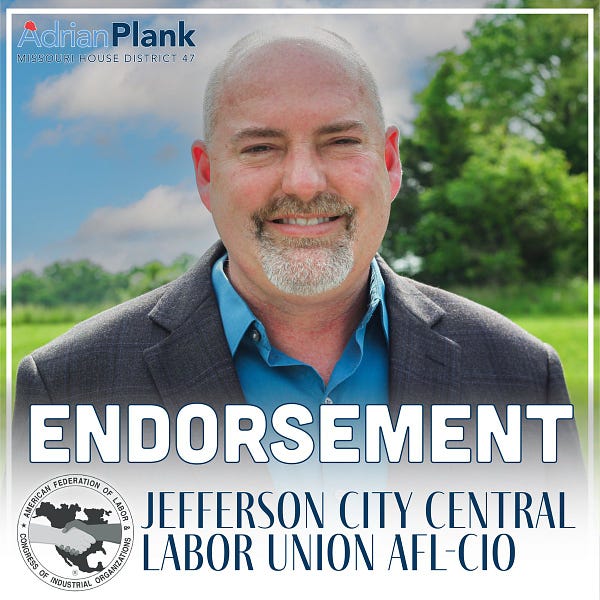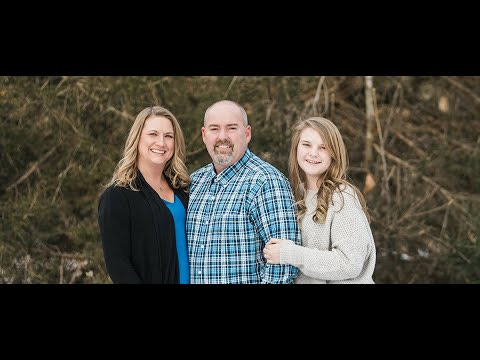Welcome to a Sunday edition of Progress Report.
Now that there are just a few weeks left nuntil the pivotal midterm elections, we’ve hit the point at which campaigns are reaching for one last boost to make it across the finish line.
Having tracked races up and down the ballot all year, we here at Progress Report are stepping up to help state legislative candidates that meet our standards, offer crucial narratives, and represent key opportunities to either help flip a GOP chamber or prevent a conservative supermajority.
You can find and donate to candidates and lawmakers on this growing list, including the activist, union member, and candidate we’ve got desired in the newsletter tonight.
As Democrats struggle to connect on the economy and continue hemorrhaging white working class voters, national party leaders might want to take a long look at a state legislative race in Missouri for inspiration down the stretch and headed into 2024.
Adrian Plank doesn’t have the background of a typical politician because he never intended on becoming one. A union carpenter and former small business owner, whatever polish he has was honed by knocking doors around Boone and Randolph Counties, pitching his biography and candidacy to locals. And when he diagnoses the problems ailing his community and the nation at large, he lays the blame in no uncertain terms.
“If you're working and living paycheck to paycheck, there's not much you can do about politics, you just gotta keep plugging, and this is the reason why we don't get policies that help working folks, just rich men,” Plank tells Progress Report, laying out his front porch presentation and explaining his own political awakening. “I always tell people, poor people don't write the tax codes. The people with all the money who own our government, they write it.”
Running in a new iteration of a district that now leans slightly blue in a state that’s settling red, Plank is betting on that sort of working class economic populism to deliver a crucial election victory in a year roiled by inflation and point the way forward for Midwestern Democrats.
Plank’s political awakening and journey track the dissolution and radicalization of the American middle class. A carpenter by trade, Plank, now 49, spent a decade building a small business that installed granite surfaces — think showers and kitchens — in hotels across the country. The company continued to grow throughout the mid-aughts, taking him from his Central Missouri home to new construction sites nationwide and giving him little time to think about the broader economy or inner-workings of government policy.
Then a gang of Wall Street bankers blew up the global financial system with junk mortgages and complicated derivative swaps, which devastated everyone but was especially catastrophic for the construction industry. Most work dried up, and the jobs that did come would sometimes make collecting a paycheck next to impossible.
“I look back and at one point I paid myself eleven hundred bucks in two years,” Plank recalls. “It was all about keeping the employees paid. I would have a project that paid [the company] $80,000, but it took them a year and a half to pay it.”
Working for essentially free wasn’t sustainable, especially with a wife and small child at home, so Plank shut down the business. The decline left him feeling “lost,” he now admits, and two years spent selling cars in a weak economy provided no new direction. It was only when Plank found a job as a union carpenter, and subsequently became politically engaged, did the purpose and drive kick back in again.
Inspired by an unlikely presidential campaign by a gadfly Senator from Vermont in 2015, Plank helped to co-found a local chapter of the sprawling grassroots organization Our Revolution. Operating adjacent to the Bernie Sanders campaign, Plank and his co-founders drove across the midwest, to Iowa and Kentucky, canvassing for the populist candidate and building on-the-ground infrastructure.
Hillary Clinton wound up edging Sanders out by less than 2000 votes in Missouri, while the two candidates split the state’s DNC delegates right down the middle. Plank didn’t object to the outcome, but instead focused on building from the ground up — not an especially easy task for Democrats in Missouri.
It’s been a rough half-decade for Show Me State Democrats. The 2016 election heralded Missouri’s official shift from swing state to a relatively red one, and the GOP has used its ill-gotten legislative supermajority to clamp down on every Democratic priority. Election losses have piled up, leading to regular shakeups at the top of the party that often result in the purging of instituting knowledge, Plank says.
The one mitigating factor has been the ballot initiative process, which progressives have used to win a higher minimum wage, Medicaid expansion, and campaign finance reform (though it was subsequently gutted by the GOP). Voters in the state are also poised to legalize marijuana via direct democracy in November, too.
As has been the case in many red states, voters have proven more than willing to back progressive policies, even as they’ve grown increasingly wary of Democrats. Plank has seen that dynamic first-hand, as he’s been involved in each of the initiatives efforts while simultaneously running his own shoestring campaigns for the legislature.


Republicans in Missouri seized their supermajority after gerrymandering the state in the post-2010 round of redistricting, passing the maps over the veto of Democratic Gov. Jay Nixon. As a result, Plank’s home in Columbia, in the relatively blue enclave of Boone County, was roped in with more conservative rural territory.
The off-kilter district lines made his campaigns for state legislature in both 2018 and 2020 very uphill battles, but Plank still outperformed the average Democrat with 43% of the vote. He exceeded expectations in part by focusing on the incumbent’s abandonment of public schools in a part of the state where many schools had been reduced to holding classes four days a week. It was a good enough showing to suggest that a working class message, with an actual budget behind it, could resonate with voters everywhere.
Missouri’s new maps put the 47th district entirely within Boone County, making it somewhat friendlier terrain for Democrats. Between a termed-out incumbent and better demographics, the district went from afterthought to being attractive enough to produce Plank’s first primary opponent. It was a hard-fought, exhausting campaign that pitted the union member against a local activist and child advocate supervisor. Plank ultimately won the nomination by less than 50 votes.
Now he’s up against a militantly anti-abortion Republican in the general election, a stark difference that he uses to frame his pitch for campaign finance reform, which tops the list of issues to which he returns over and over again.
Here’s his pitch: “The Supreme Court has ruled that it wants states to make policies, that the federal government can’t be involved, like they did with women’s rights. So if they're going to say that it's up to the states, then let's get this dark money of our state and stop allowing them to buy our policies and our politicians.”

If elected, Plank promises to make a bill banning dark money his first priority in the legislature, even if he knows the odds are not in his favor: Republicans could still retain their supermajority, while many Democrats have learned to love big money in politics, as well. Missouri Democrats are no exception; in clearing the Senate field for Trudy Busch Valentine, the party pushed out well-liked populists such as military vet and grassroots activist Lucas Kunce in deference to an heiress to a storied American fortune.
Plank grumbles about what he suggests was internal pressure applied by the national party on behalf of Busch Valentine, who wound up only eking out a win over Kunce in the early August primary. But that’s internal politics; Plank has publicly supported the party’s Senate nominee and has been heartened by her recent seizing on an issue he’s been trying to elevate for years: Russian and Chinese companies purchasing of tens of thousands of acres of Missouri farmland.
“I think that's kind of how you bridge those gaps with Republicans,” he explains. “Talk about those issues, understanding that we can't sell our farmers down the river for foreign entities.”
He hits the beats with conviction, rattling off the issues that he hears about most while knocking on doors and meeting prospective voters across the county. Unsurprisingly, the canvassing conversations indicate that “most people are tuned in on policy that affects their wallets,” even as reproductive freedom, civil liberties, and the future of democracy also continue to hang in the balance.
Polling this fall has consistently found voters concerned first and foremost with the economic pain being caused by skyrocketing prices and slowing wage growth. Democrats trail Republicans by more than 30 points on the issue in some polls, in large part because the party’s campaigns have largely refused to engage on the topic.
Having built up protections for workers, distributed historic direct stimulus to working families, and gotten close to passing a vast social program, Democrats should have the credibility to compete on the issue, especially compared to a Republican Party increasingly bankrolled by billionaires. Plank is betting his candidacy that he’s found a way to do so that seems to transcend partisanship while building a coalition in a part of the country where Democrats have barely competed.
“I don't think it matters what your party is,” Plank explains, “if you can show people that you're part of the working class and you're just there to make change, then they’ve got sympathy for that because most people are working people.”
Wait, Before You Leave!
Progress Report has raised over $6.8 million dollars raised for progressive candidates and causes. We’ve also brought invaluable attention to issues in communities that are ignored by the national media. Isn’t that cool?
None of that money goes to producing this newsletter or all of the related projects we put out there. In fact, it costs me money to do this. So to make this sustainable, hire new writers, and expand, I need your help.
For just $5 a month, you can buy a premium subscription that includes:
Premium member-only newsletters
Exclusive interviews with progressive leaders.
Financing new projects and paying new reporters
You can also make a one-time donation to Progress Report’s GoFundMe campaign — doing so will earn you a shout-out in an upcoming edition of the big newsletter!






This article was very well-written and researched. It moved me to contribute to campaigns and to your publication. There is insufficient attention on the GOP takeover of state legislatures and the need to support progressives of character willing to go out and do the hard work.